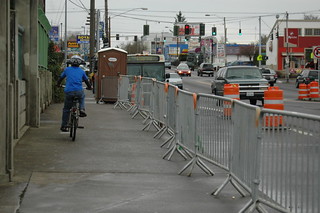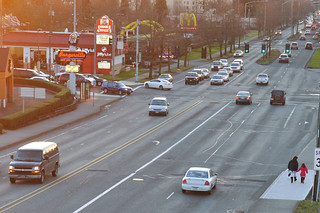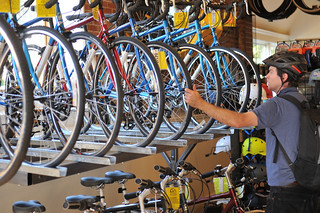Following the news in your city is like braiding hair: you won’t be able to weave it all together unless you can keep track of each separate strand.
What’s more, the whole thing only makes sense after it’s finished.
With the 1,060 front-page stories BikePortland has published so far this year — that’s 20 per week, four per weekday — we’ve tried to help you follow the braid of what matters to Portland biking in all its richness, from off-road recreation to new businesses to wonktastic policy detail to weather reports. Back when the year started, we took a crack at “33 questions that’ll shape Portland bike news in 2015.”
It’s time to step back and look at the year we’ve had. Below are answers to the 33 questions we asked nearly 12 months ago. We’ve broken them down into handy topics for your reading pleasure…
City politics and funding
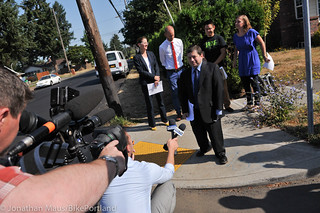
yet again and is now shooting for a local gas tax.
Will any of the holdouts on Portland’s city council — Dan Saltzman, Nick Fish or Amanda Fritz — join Mayor Hales and Commissioner Novick to approve a relatively flat transportation income tax in the early weeks of 2015? If so, how well-funded will the opponents be — and will they get the 20,897 signatures required to send the issue to voters?
Hales and Novick couldn’t find their third vote. Instead, the council kicked the issue to the state level and sat on it until Sept. 9, when two things happened on the same day: a City Club report concluded that a gas tax was the best solution for Portland, and mayoral candidate Ted Wheeler endorsed a local gas tax. Novick immediately said he liked that plan, and two weeks later so did Hales. It’s supposed to appear on the May 17 ballot.
Will the City of Portland’s neighborhood parking stakeholder committee settle on a plan this spring to redesign the city’s paid parking permit system? Will it recommend that the proceeds go to PBOT’s general fund, or be set aside for neighborhood-specific improvements?
Yes, parking reform is happening. The committee unanimously recommended the only such system in the country that would collect more than its administrative costs. The city hasn’t yet said where the extra money would go, though.
Will Mayor Charlie Hales have a credible challenger for the 2016 election by the end of this year? If so, what issues will he or she choose to run against? What about Transportation Commissioner Steve Novick?
Wheeler’s challenge was apparently so credible that Hales dropped out and then tried unsuccessfully to recruit various other people to run instead. Novick has yet to draw a high-profile opponent despite a cover story from Willamette Week essentially urging people to run against him.
Fun on bikes

Bridge Pedal participants getting the first ride.
(Photo: Will Vanlue)
Will 2015 be the year that Portland finally gets some local single track for mountain biking? Two major possibilities are the Forest Park area and Riverview property — both of which are stalled due to politics and other complications.
This wasn’t the year. Riverview remains in limbo, but things are looking good for a Metro parcel north of Forest Park.
Will someone figure out how to create a BB-8 costume for this June’s Star Wars vs. Star Trek ride?
Pretty sure they didn’t, but despite the Scrappy Doo comparisons I thought BB-8 was pretty cool so maybe I’ll do this myself next year.
Will the new Tilikum Crossing Bridge live up to the hype after its big debut in the Bridge Pedal ride in August?
The bridge basically has. The eastside approach to it definitely has not.
Will unsanctioned gravel and adventure riding continue its huge growth and lure riders away from competitive racing events?
In an interesting twist, gravel and adventure riding have become so popular that they’ve become competitive themselves. While unsanctioned events and rides like the Oregon Outback drew lots of attention and interest away from racing in circles, events like the fully sanctioned Coast Gravel Epic and the Ochoco Gravel Roubaix in Prineville found solid places on the annual calendar.
Will the Grand Prix of Portland find the sponsors it needs to bring a high-profile professional bike race to our streets in August?
Nope. The would-be organizer said it could “possibly make budget in 2016.”
Street projects
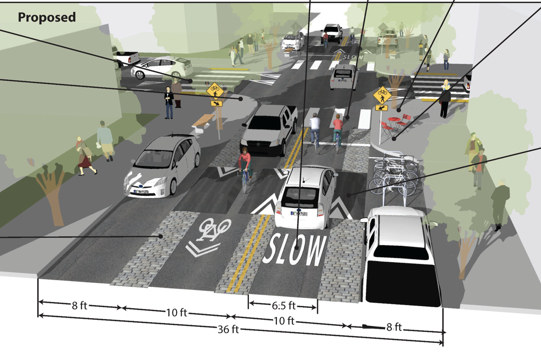
big changes weren’t in the cards for 28th.
(Rendering: Kirk Paulsen, Nick Falbo, Brian Davis)
Will Union Pacific Railroad and the City of Portland finally strike a firm deal on a legal railyard bike route between Swan Island and the Rose Quarter area, in time for Daimler Trucks North America to expand its workforce in 2016?
Not quite. But the city has signed a contract with a local engineering contractor to design three possible routes through the railyard. Expect the options to go public in the next two months.
Will Old Town create a local business district that could pay for a permanent redesign of 3rd Avenue? Will the result include a protected bike lane, or just a pedestrian plaza?
An Old Town business district still seems to be developing but doesn’t exist yet. A small plaza in front of Voodoo is coming soon, but much of the street will still be devoted to parking. Old Town stakeholders arrived at a consensus plan to put a new buffered bike lane on 3rd, but somehow failed to even discuss the possibility of a protected one. The city installed the buffered lane almost immediately.
Will property and business owners on 28th Avenue find common ground with bike advocates over a proposed “commercial greenway” on 28th Avenue?
They never got a chance to try. Some advocates and business owners seemed to like the concept but city staff were mixed on it, and with the 20s Bikeway project budget running low, the concept seems to be dead for the moment.
Will the city keep making changes to the troubled redesign of North Williams? Will it also avoid an organized backlash from bike lane opponents?
Time and a series of concrete islands seem to have calmed many of the complaints about Williams, though it remains confusing to new users. No organized backlash seems to have materialized, presumably in part because people stuck in rush-hour backup can clearly see that people on bikes are using the new lane heavily.
Advertisement
Now that ODOT’s own study has shown big advantages of adding continuous bike lanes to Barbur Boulevard, will the agency prioritize improvements? Will state legislators or other officials apply pressure from Salem?
It’s looking like the answer to all these could be yes. After state Rep. Ann Lininger contacted regional ODOT manager Rian Windsheimer to discuss Barbur, they settled on a plan to do a road safety audit that turned up a seemingly reasonable solution that could add continuous lanes. Within a month, Novick had endorsed that new possibility and even U.S. Rep. Earl Blumenauer was publicly backing it as well. We’ve heard nothing from ODOT about this since October, however.
Will Washington County agree to build its first modern protected bike lane on Merlo Road near Nike? Will it be contagious?
Yes, Merlo Road and 170th have been slated to get curb-protected bike lanes. The southern segment of 170th will be up for future funding (by 2019) in a few months. Unfortunately, the county decided not to install protected bike lanes on nearby Walker Road, just north of Nike’s campus, or 158th Avenue, just southwest, so any contagion seems to be contained.
Will a firm plan for a top-notch bikeway on Southwest, Northwest, North and Northeast Broadway finally get the city’s first world-class on-street bike route (not a project, but a complete a-to-b route) underway?
No. The city has hired a consultant for a downtown protected bike lane project but hasn’t selected the streets and won’t begin public outreach until mid-2016. However, the section of Broadway immediately west of its bridge was lined up for a protected bike lane if the city buys and redevelops its downtown post office.
State politics and funding
Will a grand alliance of transportation interests (including gas stations) convince Oregon’s legislature to hike its gas tax?
No. Apparently even gas stations couldn’t persuade politicians to endorse a gas tax hike. A closed-door attempt at a bipartisan deal fell apart almost as soon as it was exposed to public scrutiny.
If so, will the projections for future gas consumption be revised downward, the way that Washington state’s newly cautious projections were?
No, and it’s not clear whether downward revisions would be accurate. The gas price collapse of 2014 has led to a rebound in miles driven per capita, though they’re still well below the 2005 peak.
Will the package include a surcharge that would pay for state-owned city streets like 82nd Avenue or North Lombard to finally be transferred to local control?
Sort of. The legislature’s unsuccessful proposal lacked a dedicated surcharge but did include a line item that would have upgraded outer Powell Boulevard and transferred it to the City of Portland east of Interstate 205.
Public strategies and priorities
What will Portland’s survey of neighborhood greenway data reveal about their usage? Will the results be seen as a sign that it’s more important to rapidly expand the network, or to improve the existing routes?
They revealed that speeding is fairly widespread and high traffic counts are problems on some of the most important biking connections. The city’s active transportation team responded by focusing more time and money on improving existing routes, but won’t be able to continue without new money from the city.
Will the Portland Police Bureau finally get serious about bike theft by developing an internal program to address the issue?
To some extent, yes. The Portland Bike Theft Task Force launched in March and the two PPB officers who specialize in bike theft have been delivering a string of newsworthy attempts to face the bike theft problem directly.
How much staff time will the City of Portland allocate in fiscal year 2016 to its half-funded but seemingly back-burnered bike share project?
Quite a bit, it turns out — thanks to staff time in fiscal year 2015 that rejiggered the proposal to have much lower costs and much less risk for the city. That revised deal resurrected the project and it’s finally set to launch by July.
What will the Portland Bureau of Transportation’s two-year work plan — the one that’s supposed to have a road map to a Vision Zero policy — look like?
It looks pretty great, up to and including the Vision Zero policy approved by City Council in June.
Will early plans for TriMet’s Powell-Division bus rapid transit project preserve any space for bike lanes? How much?
Only where bike lanes already exist. Though nothing has been decided, it’s all but certain that Powell won’t get bike lanes east of 82nd and there’s only an outside chance of bike lanes on 82nd between Powell and Division. East of 82nd, Division (which already has bike lanes, and which unlike the other two is a city road rather than a state one) seems likely to get good ones.
Private services and economics
Lents finally got a new bike shop in 2014. Will any follow its lead where local shops are needed even more: east of Interstate 205?
Sadly, no.
What regulations will Portland manage to put on Uber-style companies before the ride-hailing service launches permanently in April?
Quite a few, among them a one-time safety course for new drivers and a fee to support taxi service for people with disabilities. Still missing, to the outrage of Commissioners Amanda Fritz and Nick Fish: a requirement for more than $50,000 of insurance coverage for Lyft or Uber drivers between fares.
Will Uber’s Portland fleet include the bike racks being piloted in Seattle?
UberPEDAL is an option in its Portland app, but on Tuesday it was grayed out, presumably because almost no Uber drivers seem to be offering it.
With a new corporate team in charge of Alta Bicycle Share, will the mystery sponsor that got cold feet last spring and killed Portland’s impending bike share launch return to the table in order to get its name on the system?
The mystery sponsor seems to be either gone or biding its time, maybe until after launch.
Will gas prices keep falling? If they do, will the number of miles driven by the average Oregonian climb for the first time since 1999?
Prices stopped falling but seem to be staying low. The number of miles driven in Oregon is almost certainly rising along with the national trend, though it’s got a long way to climb to its past peak.
Land use and development

Portland biking culture if a few things go right.
(Rendering: GBD Architects)
When the 657-apartment Hassalo on Eighth project in the Lloyd District opens for leases, will it fill up as quickly as the rest of the city’s low-car apartment projects have? Will it land the grocery store that would truly transform the Lloyd?
Yes, the three-building complex has been filling up fast and is now 45 percent leased. The first building that opened (in June) was full by August and the other two are on track to fill up by next September, three months ahead of schedule, Hassalo’s Stephanie Shaffer said Tuesday. The development hasn’t scored the full-size grocery store anchor it’s been hoping for, but high-end mini-grocer Green Zebra did jump at the chance to set up one of its somewhat smaller shops.
Once the new bridge links the South Waterfront and inner Division, will SoWa’s Zidell family find a development project that looks lucrative enough to sell off their barge business? Will Fred Meyer pull the trigger on a long-planned small grocery store in the South Waterfront?
SoWa is still waiting for that mini-Fred-Meyer, but the Zidells are moving to develop their land piece by piece. In July they signed the city’s biggest public-private development deal in a decade, including $23.8 million in public money for the new district’s streets and parks. Whether enough road space is being preserved for great bikeways, meanwhile, has been in flux.
Will anti-demolition advocates find a way to reduce demolish-and-rebuild projects in central Portland without also blocking density increases?
The city came close to a sweet spot with Mayor Hales’ proposed $25,000 demolition tax, which would have gone toward affordable-housing programs and applied only to 1:1 demolitions in single-family zones. But neighborhood associations also wanted to prevent 1:2 demolitions, and that insistence killed the proposal.
Will the City of Portland’s building boom keep outpacing Washington County’s, or will the suburbs catch up?
No, but unlike in the last few years, the burbs have been keeping pace. Multnomah County has 33 percent of the metro area’s population; as of November, its residents got 33 percent of the region’s net new jobs and it saw 35 percent of the region’s building permits.
And finally:
Is somebody going to call in a code violation on the “Keep Portland Weird” mural, or what?
Nope. Wealth may be softening Portland’s weirdness but its official self-image remains in place.
— Michael Andersen, (503) 333-7824 – michael@bikeportland.org



